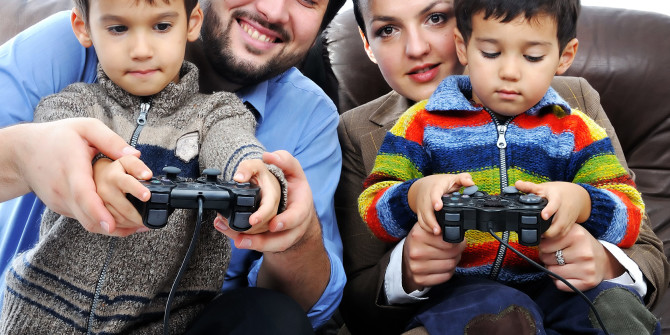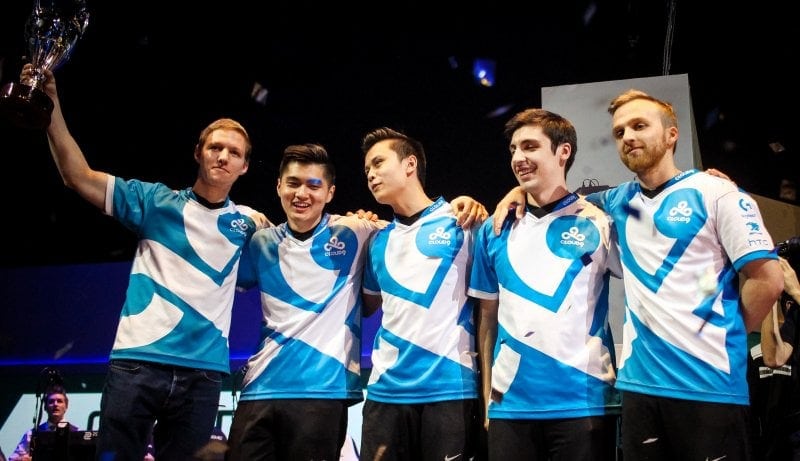
Two years ago I ran into an old high school acquaintance while I was out for lunch. Over our meal he complimented my hoodie featuring a logo from one of my favorite video games. I was surprised and delighted to hear that he was a gamer because I remembered he had been a sports jock (speaking of stereotypes) when I knew him in our teenage years. I asked him about it and he told me he had hidden his interest from friends and acquaintances to maintain his friendships and to avoid judgement.
What makes it socially acceptable for a person to carry their love of football out of high school and keep it throughout their adult life, but feel the need to hide their love of video games?
The Cultural “Other”

Video game culture is often defined in terms of the stereotypes used to describe people who play video games. This “othering” of a culture based around a hobby has been, in my experience, damaging to those within the culture by making individuals question their personal preferences and denying them a place to be around others like themselves. They sometimes struggle if they want to meet the approval of those in their lives who subscribe to social norms without sacrificing a hobby they feel helps to define them as a person.
To elaborate, “othering” is a cultural anthropology term for when a group of people is viewed or treated as intrinsically different from and alien to oneself. To other can also be described as the act of assigning someone the status of outsider, the opposite of “belonging”. (“You are not one of mine. You are one of the others.”) Othering has a very close relationship with stereotyping. Cultural othering is also an driving force behind prejudices towards minorities, immigrants, ethnic groups, religions, etc.
The Video Gamer Stereotype

For decades the stereotypical image of a gamer has been an overweight, nerdy, socially awkward man-child living in his mother’s basement, growing a thick neckbeard with Dorito crumbs in it as he vegetates on the couch all day. I’m sure you’ve seen it or something like it. We all have.
That pimply caricature of the socially awkward gamer nerd seen on television shows like South Park is simply no longer reflective of today’s diversifying gaming population (Fuller 2018). Of course, individuals similar to this caricature do exist, but it is certainly no longer the rule, if it ever was. (There is also nothing actually wrong with fitting the stereotype.) Somehow, without us really noticing, the old gamer stereotype has faded nearly out of existence.
There are several significant factors that have contributed to changing the image of the “average gamer”:
1. Generational adoption of gaming as a hobby.
2. Marketing and tech advancements broadening consumer appeal.
3. Practical application of video games to a wide variety of functions.
4. Esports showcasing players who do not reinforce stereotypes.
The stigma of being a “no-life” gamer has lessened significantly due to the prevalence of home family game consoles like the Wii U and the visibility of professional gamers in the highly profitable Esports Industry (Fuller 2018). The trend of gamer identity leaving behind basement dwelling, social outsider imagery and emerging onto competitive stages is a metamorphosis that reveals a greater cultural respect for gamers as hobbyists and professionals.

Generational Gaming and the Family Console
“For most of the last two decades, gaming has been considered an odd, insular subculture, the territory of teenage boys and those who never outgrew their teens. But now, as the first generation of gamers flirts with middle age, and as family friendly game system like Nintendo’s Wii infiltrate living rooms around the country, video games are beginning to venture beyond geekdom into a region approaching the mainstream.” (Schiesel, 2007)
This statement from The New York Times still rings true today and accurately predicted the beginnings of the cultural changes I wrote about last week.
Technology has obviously evolved over time as well, so visual graphics in games have grown more realistic and less simple-looking, allowing games to become more understandable to a growing audience, aided by accessibility of less expensive console gaming. An entire of generation children who grew up playing the original Nintendo are now adults with a healthy respect for video games as a hobby, raising their own children with a shared love of video games.
Sentiments like “video games are just for kids” are phasing out with each new tech savvy generation of consumers who enjoyed the hobby from their childhood to present day. To the contrary, there is a well-documented, positive correlation between playing video games and self-regulation, even when controlled for personality differences (Gabbiadini 2016). This leads me to the next point.
Practical Applications

In that study, it was found that because games involving strategy require planning the management of resources for reaching long-term goals, that games function as a “virtual training center for self-regulation ability in every-day life” (Gabbiadini 2016, p.129). In short, with ESRB age ratings considered, some video games can actually help train children to become more mature.
The American Journal of Preventative Medicine has noted the importance of video games as a beneficial, play-like activity. Video games are used for all manner of benefits. They are already utilized as teaching tools in schools and as an outlet for stress relief at home. For instance, the entire school district I graduated from in my home state teaches keyboarding using video game exercises starting in elementary school. This is not uncommon.
Video games stimulate the brain in complicated ways, improving eye-hand coordination as well as the understanding of new rule sets and new environments. Video games have the potential to educate: from surgical training and flight simulations to elementary education for children, and they can distract from chronic pain as well as improve self-esteem.
Anthropological research points out that the more advanced a species is, the more it plays, and humans are only growing more advanced as time goes on (Primack 2009).
Marketing and Technological Improvements

The gaming industry itself has encouraged consumer diversity, investing in this change in the form of broader marketing such as the massive cross channel campaigns for the Halo and Call of Duty, or the parade of sports titles targeted at the “jock” demographic since the 2000s. Creating games with wider appeal has been a focus of dev studios taking cues from massive successes like Minecraft, and targeting platforms with lower barriers to entry like mobile.
On the other end of the barrier of entry spectrum, virtual reality gaming has been huge draw recently. The more realistic video games look, the more interested consumers tend to become, especially the demographic that always loves to have the newest, best tech. The electronic entertainment world is fascinated by VR advancements, which in turn pique the interest of consumers who might not have been interested in gaming before.
From a social standpoint, video games also provide an easy way for people to meet and interact with one another globally through games and communities they enjoy. The more technology integrates itself into our lives, the easier it is to be attracted to video games as a both a tool for maintaining relationships and for sharing experiences together.
For many gamers, important social connections and networks are maintained through online multiplayer environments where they can interact with their peers rather than just speaking to them. Friends who have moved far away can keep in contact and continue their relationship by playing together regularly.
Revenue Brings Visibility and Respect

Media around the world reports on esports because it has become so incredibly massive in terms of both viewership and revenue (Fuller 2018). Viewers are shown images of teams that look nothing like the spectators are expecting based on internalized stereotypes.
Where are the fedoras? What about the energy drinks and Doritos? Gosh, they even look well groomed!
Spectators may see similarities to “regular people” or even themselves in the players. Exposure like this is extremely helpful in reconstructing a new, more accurate image of the “average gamer”.
Now that video gaming has become a salaried profession, average gamers are able to feel that their hobby is legitimized as a respected adult pastime. New, better self-concepts and social dynamics can result from participation in professional pursuits like esports (Seo 2015).
Gamers who once kept their hobby to themselves no longer feel a need to hide it out of embarrassment when someone asks what they do for fun. People make millions of dollars from playing video games, you know. It’s nothing to be ashamed of after all.
To Sum it Up

The timely intersection of these four major factors has caused the old video gamer stereotype to largely fade away. Video games have grown and continue to grow beyond their nerdy niche, able to appeal to people from all walks of life. Cultural perspectives about the idea of the “average gamer” have strayed so far from what the old gamer nerd stereotype used to represent that it is no longer relevant to the gaming world, even in jest. What used to be a notable portion of the gamer community has been absorbed by new audiences and diversity.
Any regular Joe you pass on the street, or your boss, your doctor, the librarian at your kid’s school — literally anyone could be a gamer!
At my day job, colleagues are sometimes surprised to learn I’m capable of spending an entire weekend marathon-ing long sessions of multiplayer games with friends. They usually say something along the line of, “Really? You don’t look like a gamer!” That’s the point — gamers don’t look like anything in particular these days thanks to the widespread allure of the hobby. Gamers are well on their way to being considered “normal”. The old video gamer nerd stereotype is a relic of the past and society is on its way to catching up with reality.
Thank you for reading!
Source List
Gamer Culture Post Archive![]() Support Backlog Crusader on Patreon – $1 a month is less than what’s lost beneath your couch cushions!
Support Backlog Crusader on Patreon – $1 a month is less than what’s lost beneath your couch cushions!

Wow, what a great write-up! It’s definitely true that the stereotype has faded from the public viewpoint, and I’m very grateful for it! Even in grade school some of my friends and I were teased because we liked things like Pokémon, when in actuality we were the perfect age to be pulled into its media vortex. When I was in early high school, a group of the “jock” kids got into World of Warcraft when it first hit the scene. I actually noticed that people didn’t put gamers down as much after that because it was “normalized,” as awful as it sounds to say. Hopefully the trend continues and people just agree to like whatever they want to like without fear of ridicule!
LikeLiked by 2 people
Thanks so much for your thoughtful comment! I’m glad this piece resonated with you. I had a very similar experience with Pokémon and other games at that age. Normalized is exactly the word for it. In fact I might go back and edit that in here and there hahah.
The weird part is now you see this internal, polarized rift between casual and hardcore gamers with a host of problems of its own like gatekeeping. “You aren’t a real gamer if you only play Call of Duty” and such. Insular gatekeeping might be a good subject for another gamer culture post. 😮
LikeLiked by 1 person
That would be a great topic to write about! It seems to me like it’s the exact same issue of acceptance as before, but the focal point has shifted down the line into new territory: it’s now acceptable to be a “gamer,” but only if you play the right kind of games. I don’t know if it’s a factor of acceptance, wanting to feel superior to others, or whatever else, but it really would be great if people could just enjoy things without contest. And again, yes! That would be an amazing post! 🙂
LikeLiked by 1 person
I think I said as much in my comment on your previous article on Gaming Culture and youve begun to discuss it here. “Gamers”, after largely being açcepted by the outside world, are becoming their own worst enemy. There’s always been an element of elitism (as their are within most, if not all, sub-cultures). Like you said, you still get that snobbishness that you aren’t a “real gamer” if you don’t play X or because you play Y you must be casual, because you don’t have a collection that’s wall to wall to appear in the background of your stream then you aren’t a gamer etc etc, it goes on an on.
That to me is both toxic and insular. But I think it’s also a symptom of the hobby becoming more mainstream, the successful titles are shunned as those who have been ostracised suffer a type of anxiety that makes their hobbies acceptance difficult to accept.
It’s also why, despite having a ridiculous sized collection that I’ve amassed since I was about 13 (most of which is in my attic/loft due to space issues that come with being a 34 year old with 3 children), I don’t actively label myself as a “gamer” any more. I feel I’ve outgrown labels and am happy to be me, a beer and coffee drinking, punk music listening, sci-fi movie, book and comic book reading, football/soccer and Motorsport watching videogames player.
LikeLiked by 1 person
Oh I complete agree! Elite gatekeeping is obnoxious and unnecessary. Your have some really insightful thoughts on the topic. Might be worth a deeper dive blog post of your own too. I’ve added the topic to my draft list. 🙂
LikeLike
Great piece of writing, enjoy the more in-depth pieces especially pivoted away from gameplay and more around the culture and the academic critique. Top job as usual 👍🏻
LikeLiked by 1 person
Thanks so much! I love writing about this kind of stuff and am always open to suggestions as well.
LikeLike
I’m loving these articles where you closely examine gaming using scholarly sources! They’re insightful and a joy to read!
LikeLiked by 1 person
I really appreciate you taking the time to comment! There are more like this coming down the pipeline. I’m trying to stick to one a week for now but the pace will likely slow down as I exhaust my past academic material. As I’ve mentioned to others, I’m always open to suggestions for new post ideas along the same vein.
LikeLike
I’m looking forward to reading more of these!
LikeLiked by 1 person